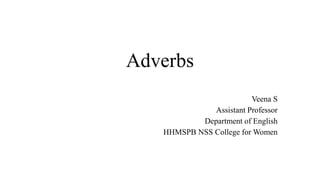
Everything You Need to Know About Adverbs
- 1. Adverbs Veena S Assistant Professor Department of English HHMSPB NSS College for Women
- 2. Adverb • An Adverb is a word that modifies a Verb, an Adjective or another Adverb. He works sincerely. (modifies a Verb) He is a very sincere worker. (modifies an Adjective) He works very sincerely. (modifies an Adverb) Most adverbs are formed by the addition of ‘ly’ to their corresponding adjectives. For e.g. cleverly, quickly, beautifully, wisely, sadly, patiently etc.
- 3. Kinds of Adverbs 1. Adverbs of Time Now, then, today, soon, early, before, late, lately, recently, formerly, ever, never, after, yet, still, ago, already etc. 2. Adverbs of Place Here, there, up, down, inside, outside, away, afar, nowhere, everywhere, backwards, onwards etc. 3. Adverbs of Manner (or Quality) Bravely, beautifully, well, thus, so, quickly etc.
- 4. 4. Adverbs of Frequency Often, frequently, occasionally, rarely, barely, scarcely, usually, casually, always, never, seldom, hardly ever etc. 5. Adverbs of Degree Fairly, rather, very, quite, extremely, highly, too, enough, totally, entirely, almost, nearly etc. 6. Interrogative Adverbs When, where, why, how, how far, how much, how soon, how often etc. 7. Relative Adverbs Where, when, how
- 5. Position of Adverbs • Adverbs generally stand near the Verbs modified. But they have the highest degree of freedom of mobility. Hence they have no fixed positions in sentences. However certain conventions are followed: 1. Adverbs are placed after Intransitive Verbs. He sleeps well. She came early. 2. Placed after the Object, if there is one. He returned the books immediately. She finished the work quickly.
- 6. 3. Adverbs of Frequency are often placed after be, if be is used as the Main Verb. She is seldom late. I am always honest. 4. Frequency Adverbs are usually placed before the Main verb when there is no auxiliary verb. They never visit us. He seldom rises early. 5. Adverbs are usually placed after the first auxiliary. The train has just left. I am eagerly waiting for the results. 6. Time adverbs can occur initially or finally in a sentence. He reached here yesterday = Yesterday he reached here.
- 7. 7. When there are two or more Adverbs, the accepted order is M – P – T (=Manner, Place, Time) I sat quiet in the corner for an hour. The child slept well in the cradle for some time. The violinist played sweetly at the concert for nearly three hours. 8. When there are two or more time references, the particular should precede the general: I was born about 7 pm on Saturday, 12 January 1946
- 8. Uses of some Adverbs • Too • Enough • Hardly, scarcely • Else • Ago, before • Much, very • Fairly, rather • Late, lately • Still, yet • Only, alone, lonely
- 9. • The use of too Too means ‘more than enough’ and has a negative sense: He is so proud that he will not apologise He is too proud to apologise • The use of enough Enough means ‘adequate’ and has a positive sense: We have done enough to satisfy them. He is tall enough to touch the ceiling. • Hardly, scarcely Both hardly and scarcely should be followed by when: Hardly/scarcely had he reached the station when the train left. (The adverb hardly has nothing to do with the adverb hard)
- 10. • Else Else should be followed by but: We have nothing else to do but wait and hope. • Ago, before Ago (= from now) can be used only with reference to the present time. He was born twenty years ago. In Reported speech, ago becomes before. She said, “I met him five years ago.” She said that she had met him five years before. • Late, lately He came late. I have not seen him lately. (=of late, recently)
- 11. • Much, very Very is used before an Adjective: She was very happy. The attendance was very thin. Much is used before a Past Participle. I am much obliged to you. She is much indebted to her brother. These two adverbs are not interchangeable. • Fairly, rather Fairly has only a positive sense. Rather is used in both positive as well as negative sense. This question paper is fairly easy. Yesterday’s examination was rather difficult.
- 12. • Still, yet He is still at work. (to a particular point of time) He hasn’t arrived yet. (= so far) • Only, alone, lonely Only means ‘the sole one of a class’ He is my only son. Alone means ‘exclusively or solitarily’ He alone can solve the issue. Lonely is an adjective, not an adverb She lives a lonely life there.